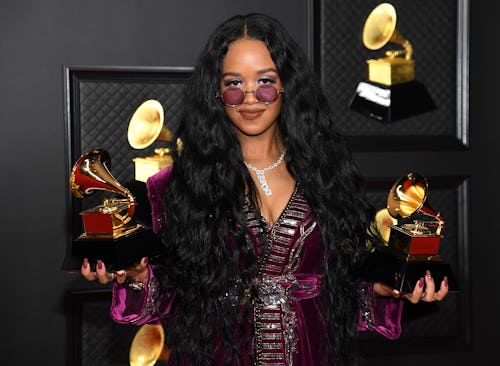The Grammys have changed, but not evolved
They get some right — and a lot wrong.

Depending on who you ask, the Grammys have either been teetering on the brink of irrelevance or fully submerged in the abyss after years of controversial nominations and snubs. This year, The Recording Academy shook up the Grammy nomination process and produced some of the sanest nominations in the award’s history.
Following The Weeknd’s inexcusable omission from Grammy nominees last year (and his subsequent dunking of the entire Grammy process), along with years of confounding nominee choices, the Grammys decided to fundamentally change and join us in the present. The biggest change was its disbandment of the secret nominations review committee which consisted of unknown music industry professionals who were the final say in which artists get nominated for the biggest categories. Artists, including The Weeknd, have pointed to that shadowy consortium as making those decisions based on personal relationships rather than the merit of the music, which is the only logical explanation for why a historically successful album like The Weeknd’s Blinding Lights would be snubbed and why Taylor Swift could win her third Album of the Year award in 11 years. Instead, this year’s nominees were chosen strictly based on the majority vote from the academy’s 11,000+ voting members.
While Swift’s Folklore earns her yet another Album of the Year nomination, artists like John Batiste and Doja Cat earn their first nominations in the prestigious category with their albums We Are and Planet Her (Deluxe), respectively. The same is true for Giveon who scored his first Best R&B Song nomination even though his Take Time album was one of the best R&B projects of 2020 and his feature on Drake’s “Chicago (Freestyle)” was a Billboard hit the same year. Besides the fingerprints of a meddling anonymous voting committee noticeably absent in egregious Grammy snubs in the big four categories (Song of the Year, Record of the Year, Best New Artist, Album of the Year), the Grammys helped itself by expanding how many people can be nominated for awards.
The number of nominees for the big four awards expanded from eight last year to 10 this year, double the number of nominees from as recently as 2017 when Rihanna’s sultry masterpiece Anti was shut out of Album of the Year as Justin Beiber’s less impactful Purpose album was in the mix. This expansion undoubtedly helped Batiste score his first nominations for Album of the Year and Record of the Year in the 16 years since his debut album Times in New Orleans. If the nomination pool was still eight, it’s entirely possible the brand recognition of legacy acts (ABBA, Kanye West, and Tony Bennett), Billboard mainstays (Doja Cat, Bieber, and Billie Eilish), and viral sensations (Lil Nas X and Olivia Rodrigo) would’ve left little to no room on the lists for his genreless musical mastery. The lack of a biased committee paired with expanded nominations helped pave the way for relatively unheralded composer Arooj Aftab to score a Best New Artist nomination among 2021 hitmakers like Saweetie, The Kid Laroi, and Olivia Rodrigo.
While the biggest surprise of these Grammy nominations is the lack of surprising snubs, the Grammys are still the Grammys and prone to mistakes. The Grammys historically have had huge issues with the rap categories, most notably awarding Macklemore & Ryan Lewis’s The Heist the Grammy for Best Rap Album in 2014 over albums from Kendrick Lamar, Drake, Jay-Z, and Kanye West. This year, they decided to give Jay-Z two Grammy nominations in the Best Rap Song category for his work on DMX’s “Bath Salts” and Kanye West’s “Jail.” In a year when female rappers like BIA (“Whole Lotta Money”), Megan Thee Stallion (“Thot Shit”), Lauryn Hill (Nas’s “Nobody”), and Coi Leray (“No More Parties”) had better-received performances than most of the male rappers of 2021, their exclusion in favor of legacy plays is another folly in a long history of hip-hop mistakes by the Academy. Megan’s “Thot Shit” was nominated for Best Rap Performance, but Baby Keem’s “family ties” and J. Cole’s “My Life” were able to appear in both categories and not Megan's. Hip-Hop is too good for a handful of rappers to monopolize the few rap categories the Grammys gives the genre.
The Grammys have also rewarded men with despicable pasts. Thanks to Ye’s inexcusable inclusion of DaBaby and Marilyn Manson on his Donda album following allegations of Manson’s extensive history of alleged sexual abuse and DaBaby’s offensive remarks about homosexuals, both men are nominated in the Album of the Year category. DaBaby actually is twice as likely to win an Album of the Year award as most of the nominees since he’s also featured on Bieber’s Justice (Triple Chucks Deluxe) album. In a more shocking turn of events, exiled comedian Louis C.K.’s Sincerely Louis C.K. is nominated for Best Comedy Album, even though it features him making fun of a few of the sexual harassment allegations lobbed at him. If any of these men are able to walk away with any of those awards, the Grammys will be rightfully dragged through the mud.
There are no snubs that make you suspect corruption like what happened to The Weeknd at this year’s awards or wonder if the Grammys were lowkey racist like when Tyler, the Creator’s punk rock album Igor was nominated and winning Best Rap Album in 2020. The Grammys need to put more respect on women rappers’ names, and stop rewarding people with egregious allegations. But overall, the 64th Annual Grammy Awards will be one of the best representations of the diversity of a great music year the Recording Academy has ever put on.
Unless Lil Nas X’s Montero loses Album of the Year and DaBaby, Manson, and/or Louis C.K. win. Then, we riot.